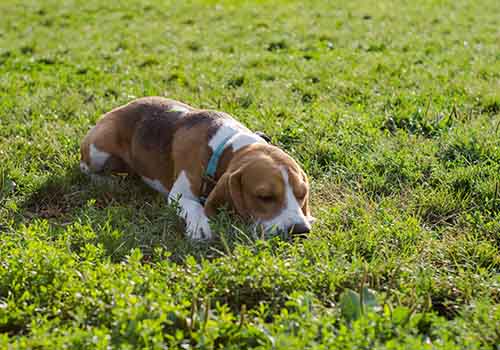Do you struggle with your Beagle’s barking, baying and howling and feel the intense frustration of being unable to stop it? Find out if you are making of these mistakes and what to do instead.
Beagles have a “big voice” for their size. Granted. The name “Beagle” is thought to have derived from the French “begueule” or “open throat” and probably there was a good reason for this theory. Beagles do know how to bay, bark and howl.
They have three distinctive styles of vocalization:
- Barking when they are alerted or want something;
- Baying when hunting to let their master and pack know that they have found something and;
- Howling when they are sad or bored
This is closely connected to the first three mistakes that we will be analyzing in this first part:
MISTAKE 1 – Expecting your Beagle never to bark
It is true that every dog, from working dogs and herding dogs to hunting dogs (like your Beagle) were originally bred to bark and produce some kind of noise. Therefore, expecting your Beagle to be “mute” is quite unrealistic. It can also be dangerous because dogs bark as a way of communicating with you and you wouldn’t want them to remain quiet in the presence of a threat.
What should you do instead? Learn how to minimize the barking when necessary.
Learn How To Stop Your Beagle’s Barking For Good
MISTAKE 2 – Not understanding the reasons for their barking
Beagles usually have a good reason for barking, even if you may not see it that way (and let’s not even mention the neighbors). Barking is, after all, one of their ways of communicating with other animals and with you.
Let’s have a look at the most frequent ones:
- Boredom or loneliness – one of the most frequent reasons for Beagles to bark or howl. A deadly mistake is leaving your Beagle unsupervised outside in the garden. You will only drive your neighbors crazy and they might end up calling the police or letting your Beagle out.
- Hunger – Are you running late with your Beagle’s dinner today? They might just be letting you know – and remember how important food is for a Beagle.
- A warning – Are they trying to alert you of some strange circumstance?
- Anxiety – Have you trained your Beagle to be content when you are not home and to know that you will come back? Does your Beagle have everything they need during your absence? Beagles, in general, don’t lie to be left alone at home and may suffer from separation anxiety so if this is the reason for your Beagle’s barking, proper training definitely helps.
- A need to go out – Is your dog trying to let you know that you have done a fantastic job at housebreaking them so they need to go out?
- Attention – Is your Beagle seeking your attention? The trick here is to find the right response that doesn’t reinforce the exact behavior you want to avoid.
- Fear – Is your Beagle alarmed by an unfamiliar situation and barks out of confusion?
- Communication with other dogs – Is your beagle saying “hi” to another dog? Is it aggressive barking that needs to be addressed with proper training?
- Playfulness – Is your Beagle barking to show their excitement?
Once you understand the reason why your Beagle is barking, you can decide if there is a good reason or not on case-to-case basis. If there is in fact a good reason, there is no need to get upset or punish your dog, while under other circumstances you need to train your Beagle that barking is not allowed for the sole sake of barking.
MISTAKE 3 – Not acting as the alpha leader
Beagles are pack dogs that need a strong alpha leader to feel safe. If you are not acting and communicating with your Beagle consistently as the alpha leader in your household, your Beagle gets confused and assumes that they should be that leader and they should be protecting the pack.
If you haven’t got your free report on how to become the alpha dog and solve your Beagle’s behavioral problems, go here.
One of the best ways of showing your leadership is to remain consistent with your commands and do command training, which by itself can frequently be enough for your Beagle to stop barking.
MISTAKE 4 – Creating the wrong connection in your Beagle’s brain
If your Beagle barks a form of manipulation (to get treats, for example) and you give in just to stop the barking, you are reinforcing the connection “barking = getting what I want”.
Instead of rewarding the wrong behavior, start rewarding only good behavior. Teach your Beagle a “stop” command and reward them when they stop barking with a treat.
For the ultimate training guide to solve your dog’s barking for good Click Here
MISTAKE 5 – Not providing enough exercise
Since boredom is very often a reason for their barking, make sure your Beagle is getting plenty of exercise, which helps also with their training.
MISTAKE 6 – Yelling “no” and expecting your Beagle to stop barking
Yelling doesn’t help because your dog either gets confused and barks out of the frustration of not understanding what’s going on (remember that dogs don’t understand human language) or misinterprets your yelling as you barking along and starts to bark even more.
MISTAKE 7 – Providing loving attention when your Beagle barks
If you do, you will only increase the anxiety or fear that caused the barking in the first place because you are sending the message that they were right in barking at whatever they started to bark.
It is much more effective to resort to training by teaching your Beagle simple commands that include speak and be quiet, giving you more control and shifting your dog’s attention from whatever caused the barking in the first place to you.
If you want more advice on stopping your dog’s barking for good, Click Here




